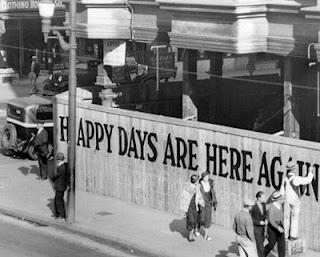One item that went largely unnoticed in June’s jobs report was a startling drop in the number of full-time jobs — a whopping 713,000 jobs were lost where the time of work is more than 34 hours a week.
In the meantime, the number of part-time jobs jumped by more than 1.1 million.
Meaning, the 0.2 percentage point drop in the unemployment rate to 6.1 percent was owed almost entirely to full-time workers taking on part-time work. Hardly a promising indicator.
Couple that with the 2.9 percent downturn in growth for the first quarter, and we’re on the cusp of another recession.
Which, in itself, would not be that surprising. The economy moves in cycles, averaging a recession once every 6 to 7 years since 1947.
Since the last recession was five years ago, we’re basically due for another one any time now.
Which is not good when you consider that since World War II, this has been by far the weakest recovery on record, in terms of growth, job creation, housing prices, and everything else.
That, despite the constant promises from the Federal Reserve that a robust recovery has always been right around the corner.
As recently as March 19, 2014, the Fed was projecting anywhere from 2.8 to 3 percent growth in real Gross Domestic Product (GDP) for the year. Its December projection for 2014 was 2.8 to 3.2 percent growth.
Instead, the economy is shrinking, again, at an annualized 2.9 percent rate.
To get back to just the low end of its original forecast, the economy will need to grow an average of 4.7 percent each quarter for the next three quarters. Good luck with that.
Accordingly, the Fed has reduced its growth outlook. Now, it only sees 2.1 to 2.3 percent growth for the year. Still, to get there even, we still need to see 3.7 percent growth each quarter for the next three quarters. Is anyone the least bit skeptical of this rosy outlook?
The Fed has been off on almost everyone of its projections since 2008.
In January 2008, the Fed neither saw a recession nor a financial crisis on the horizon. It projected between 1.3 to 2.0 percent real growth in 2008, and between 2.1 to 2.7 percent growth in 2009.
Instead, the economy contracted by -0.3 and -2.8 percent in 2008 and 2009, respectively.
By October 2008, as markets were crashing, the bank changed its tune. The economy was slowing down considerably, but likely would not shrink. 2008 would see between 0.0 to 0.3 percent growth, and 2009 between -0.2 to 1.1 percent. Wrong again.
In January 2009, in the midst of severe financial distress, the Fed finally thought a recession would happen, but would be mild, projecting a contraction between -1.3 to -0.5 percent that year. Still way off. Again, in 2009, it went down -2.8 percent.
Similarly, the Fed’s track record in projecting a recovery has been way off. That year, the Fed projected a V-shaped recovery after 2009. The economy would grow between 2.5 and 3.3 percent in 2010, and between 3.8 and 5.0 percent in 2011.
By January 2010, the Fed had changed its expectations slightly for 2010 — by raising them. Then, they said the economy would grow between 2.8 and 3.5 percent in 2010, although they lowered their expectations for 2011 to between 3.4 and 4.5 percent.
Instead the economy only grew by 2.5 percent in 2010, and by 1.8 percent in 2011. Wrong again.
Even as late as June 2011, the Fed was projecting between 2.7 and 2.9 percent growth for 2011. Way off. Again, the economy only grew by 1.8 percent in 2011.
In January 2012, the Fed said the economy would grow between 2.2 and 2.7 percent — just barely meeting its forecast that time when it came in at 2.2 percent for the year. Like the broken clock, it finally got one right.
In March 2013, the Fed predicted the economy for that year would be 2.3 to 2.8 percent. Wrong again. It only came in at 1.9 percent.
That’s not a good track record. Perhaps the central bank is asleep at the wheel. Or maybe, they lack perfect information about market conditions, and won’t know a recession is coming — until it does.
Robert Romano is the senior editor of Americans for Limited Government.







